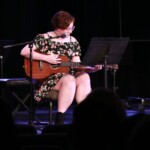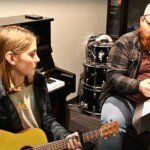With the success of television shows like America’s Got Talent, children from kindergarten to high school are begging for their shot at fame. But how does a parent know when to start vocal training, or when to begin singing lessons? While there is no definite answer, here is some insight into that question!
Many parents ask for voice lessons for students as young as 3 or 4 years old, but formal vocal training is not usually successful or appropriate for students this young. Younger children might love to sing, but a focused lesson that focuses solely on vocal technique can be extremely difficult on young, undeveloped vocal chords. In addition, young children seldom have a strong sense of self or the physical awareness to process the teacher’s directions in a meaningful way.
It is best to begin singing lessons once the student’s voice is more grounded and they have begun to go through puberty. Similar to how a fine wine gets better with age, the vocal quality and tone of a person’s voice continues to change through different phases of their life. Once a student has started the process of going through puberty, they will achieve more significant and measurable progress on their instrument.
Puberty can occur at different ages, but typically around age 11 or 12 most children’s voices are in the process of undergoing drastic changes, influenced by hormones. Many teachers use this as a guideline for when the correct age to begin vocal training is.
Does this mean your 10-year-old can’t start vocal training? Of course not! The important question then is not when to start lessons, but what is the goal of the music lessons?
Very young children are not exposed to instruments in order to master them, but to gain experience and learn to develop meaningful relationships with music at a young age. If this is your goal, then the “lessons” can and should start soon after birth and certainly within the child’s first year.
These “lessons” do not have to be—in fact, at first probably shouldn’t be—very formal. A parent can serve as guide by immersing the child in a musical environment. You should help your child focus on the music with simple movement activities such as musical games, swaying or dancing while holding the baby, or singing or playing an instrument for the child.
Once the child is around age three, it may be time for more formalized “lessons.” Again, the goal is not to learn to play an instrument but to further develop skills like identifying a beat in music, identifying melody, or identifying instruments. These parent-child lessons might be any number of preschool classes run by private individuals, universities, or community centers. To decide whether or not a class is suitable for your child, make sure your goals and expectations coincide with the teacher’s.
By age five, most children have built a foundation that has prepared them for formalized lessons. Even now, the goal of the lessons is not to become a great performer on the instrument but to further the understanding of music. Piano and violin are the two most common instruments played at this age, but others have tried the recorder, guitar, or ukulele with success.
By age 10, the child will have a variety of skills associated with their instrument of choice. They’ll also have the physical strength to try a different, bigger instrument, such as a brass or large string instrument that requires a higher level of strength and stamina. Around this time, the goal of lessons appropriately transitions from gaining experience with music to improving performance ability.
In summary, there are three answers to the question, “What age should children begin music lessons?” Informal activities with music should start soon after birth, followed by more systematic classes around age three, and lessons with the goal of learning the instrument should start between six and nine. Keep in mind that these are only guidelines; exceptions will undoubtedly occur based on the child and/or teacher. Musical experience at an early age is extremely important in a child’s developmental process. Like riding a bike or learning a language, these skills can be learned later in life, but they will never be “natural” in the way that is so important for fluid musical performance.
The Omaha School of Music and Dance has classes for all age groups! Each class is tailored to the specific needs of each age. For example, we have three Music Fun Time classes for ages 18 months- 3 years, 3-5 years, and 5-7 years. Furthermore, our Intro to Voice classes are recommended for ages 6-10.
Please give us a call at 402-515-9639 to discuss what class is best for your child. You can also find more information at https://omahaschoolofmusicanddance.com/voice-lessons-omaha-ne/.



